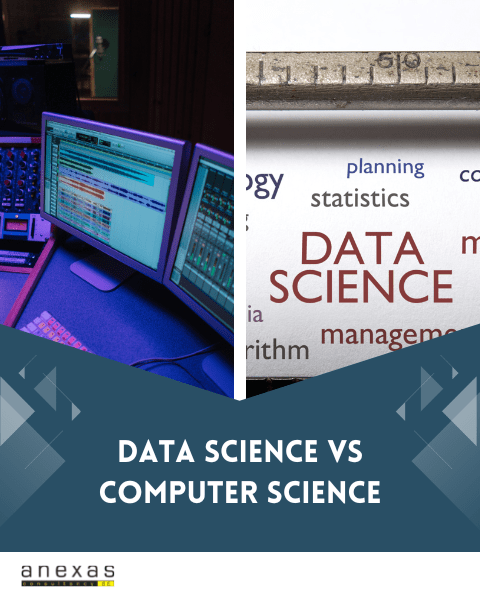Table of Contents
Share This Article
Data Science vs Computer Science
- 27916 views
Computer Science is the study of the theory and practicality of computers. Whereas Data Science emerged due to the advancements in the fields of computer science. Due to large and complex sets of data being generated every day, the need for a separate area of work on data came into existence. Therefore, data Science is a subset of Computer Science which is concerned with handling data. In the debate of Data Science vs. Computer Science, there is a need to discuss the two distinct fields in detail.
In this article we are going to discuss the common myths about Data Science vs Computer Science, which will help you in deciding which technical career to take.

Difference between Data Science and Computer Science
The main difference between Data Science and Computer Science is that where Computer Science is all about how a computer works and advancing its efficiency, Data Science is a subset of Computer Science that is required to handle the complex data generated and obtain information from it
Are you interested in knowing more about Data Science? You can join this free introductory session on Data Science to learn more about data capturing, storing, processing, cleansing, and communicating and ask your queries at the same time.
What is Data Science?
In the world of computers, data is a very significant part that gives insights to use in the development of organizations in a more informed way. This is where data science steps in. Through algorithms, techniques, and statistics, data science focuses on gaining information from a large set of structured, unstructured, and semi-structured data.
How does Data Science work?
Data Science is a multidisciplinary field that works in big data, data mining, data warehousing, data analytics, and machine learning to gather data insights that can be ultimately used in product or business development. For example, Data science studies search history to know about user behaviour which can be used to suggest ads.
Career in Data Science
When we compare Data Science vs. Computer Science jobs, data science is a vast field and being relatively new, has a lot of jobs to offer. Data Science positions are high on demand and fewer professionals are present to work, making it a progressive career path. There are various graduation and postgraduation programs to study fields of data science but students and professionals of computer science can also take up a career in data science by attending certification courses in Data Science.
Data Science – Basic Course
Data Science – Intermediate Course
Data Science – Advanced Course
What is Computer Science?
Computer Science is a field of computer design, architecture, manufacturing, and development, concerned with the growth of information technology. Some of the key concepts in Computer Science are programming languages, algorithms, and software engineering, which work in the areas of database, network, and security to advance the field of computers.
How does Computer Science work?
Similar to Data Science, even Computer Science is concerned with the company and its business. Computer Science serves in the fields of efficiency of computers and technology. It involves developing websites and applications, writing algorithms, and working on programming languages to constantly improve and build products and services.
Career in Computer Science
A bachelor’s degree in computer science attracts more IT and software companies where you can apply your skills. Though a master’s degree will upskill you and provide you with a better position and salary. Studying mathematics and computer science in school sets the way for a career in computer science early. Nowadays, there are many online programs associated with notable universities as well which offer degree programs. Also, there are several programming courses like Java, Python, etc. which will help you in different industry jobs.
To compare the Data Science vs. Computer Science salary in India, Data Scientists, with their expertise in deciphering vast data sets, often have a higher starting salary compared to traditional computer science graduates. However, as computer science professionals specialize in areas like machine learning, their compensation can rival those in data science. Ultimately, experience, location, and the specific role influence these salary dynamics significantly.
To understand the difference more clearly, let us compare some common factors between Computer Science and Data Science
| Factors | Computer Science | Data Science |
| Definition | Computer Science is the study of computer operations. | Data Science is the study of data computing. |
| Origin | Coined by Geroge Forsythe in the 1960s. | Coined in 2008, by D.J. Patil and Jeff Hammerbacher |
| skills | Problem solving Coding Programing languages Software development Technical writing Teamwork Communication |
Machine learning Deep learning Data visualization Programming Business knowledge Communication Big data |
| Use | Advancement of technology | Management of data |
| Benefits | Better performance | Lesser data redundancy |
| Job profiles | Software development engineer Software developer Java developer Systems engineer Network engineer |
Data Scientist Data Analyst Data Engineer Data Architect Business Analyst |
| Industries | Information Technology and Software | Any industry which needs data for growth |
| Field of work | Technology | Data under technology |
Difference between Data Scientist and Computer Scientist
The main difference between Data Scientists and Computer Scientists is that Computer Scientists study components of computer systems, hardware, or software to improve performances, whilst Data Scientists study database systems, structured and unstructured to gain insights for business decisions.
Let us compare aspects required in a Data Scientist vs. Computer Scientist to understand the roles better.
| Factors | Computer Scientist | Data Scientist |
| Description | Applies theoretical knowledge to real life problem to advance technology | Applies data-related studies and insights to solve business problems. |
| Educational qualifications | At least a graduation in a relevant area. | Mostly requires graduation and masters both. |
| Roles and responsibilities | Understanding business; its products, data and software. Designing softwares and systemsTesting, documenting and debugging codesBuild and optimise codesOperation and maintenanceTeamwork | Understanding business; its products, data and objective.Collecting, cleansing and optimising data. Building data models.Asking business related questions. Analysing data. Presenting findings using data visualisation. |
| tools | Python Object-Oriented Programing languagesSlackAmazonVisual Studio | R or PythonSQLTableauPowerBISparkAirflow |
| Job opportunities | Many opportunities in IT and software industries but more competition. | Many opportunities in healthcare, finance, telecommunication etc but less competition |
How to succeed? Data Science vs Computer Science
How to succeed in Data Science?
A few key points to succeed in Data Science careers:
- Understanding goals and objective of the business involved
- Determining the use of data for achieving the goals.
- Flexibility and adaptive nature.
- Openness to new ideas.
- Developing and presenting solutions.
- Working with different departments
- Understanding the type and nature of data required.
- Understanding customer behaviors and habits to satisfy their needs.
How to succeed in Data Science?
A few key points to succeed in Data Science careers
- Conceiving computer and maths related problems.
- Writing codes, creating applications and developing websites.
- Mathematical modelling to establish interaction between computer and human.
- Updating knowledge of programming frequently.
- Communication skills and teamwork.
Data Science vs. Computer Science vs. Data Analyst
Data Science focuses on extracting insights from complex and unstructured data, employing algorithms, statistics, and machine learning. Computer Science, on the other hand, is a broader field, delving into the principles of computation, software development, and the design of computer systems. Meanwhile, a Data Analyst typically works with structured data, using statistical tools to spot trends and generate reports for decision-making. While there’s overlap, especially in the tools and techniques used, each has its unique emphasis and scope, catering to different facets of the expansive digital world.
Which is a better career option for you? Data science or Computer science
Now that we know all about Computer Science and Data Science and are also aware of the job requirements in both areas, I think it is easy for you to choose which one is better for you. Though there are many similarities in terms of coding, programming and communicating; the major difference that will help you in making decisions is that Computer Science works with computers where Data Science works only with data. Where Computer Science is more about developing the whole Information Technology sector, Data Science is about developing a business. If you want to work with stakeholders and handle data, Data Science is the field for you and if you are interested more in mathematics and developing softwares, choose Computer Science.
To know more about Data Science, take this free introductory session which will cover all the details about Data Science and help you make an informed decision.
Data Science vs. Computer Science: which is easy?
When weighing data science against computer science, it’s not about which is “easier,” but where one’s aptitude lies. Data science leans into statistics and data interpretation, while computer science emphasizes algorithms and system architecture. Ultimately, the ease of navigating either domain hinges on personal interests and innate strengths.
To learn more about Data Science, take this free introductory session which will cover all the details about Data Science and help you make an informed decision.
Conclusion:
In the end, we can conclude that Computer Science is the superset of Data Science which works on computers, hardware and software operations. Where Data Science is the subset that works on data which is available online, structured and unstructured, to gain insights. Both require understanding the business, need of customers, coding and programming languages and need to work on the frontend.
But both are different as well. Where Computer Science is about mathematical models, data science is about data models. Computer Science works for advancement in technology, Data Science works for managing data for business purposes. Both the fields are high in demand, but there is less competition in Data Science as it is comparatively new and unexplored
FAQS
How is Data Science different from Computer Science?
Data Science is the study of data using computing, maths and statistics to find insights where Computer Science is the study of computers to build hardware and softwares.
Which is more difficult, Data Science or Computer Science?
Data Science is a subset of Computer Science which came into existence because of advancement in computer science. So, Data Science is a more narrow field and can be considered as easier than computer science.
Is coding required in Data Science?
Yes, Coding is not regularly used but the knowledge of coding is required to optimise data and model data.
Do I require a computer Science degree to be a Data Scientist?
No, it is not required to have a degree in computer science to take a career in Data Science. You can go for Data Science degree courses, diploma and even certification courses to excel in the field. Though there are several aspects of computer science which are required for Data Science, like coding and programming which can be attended by certification courses as well.
Which pays more, Data science or Computer science?
Data science pays more than computer science due to its requirement in all major industries like healthcare, security, communication etc.
Can Computer scientists become Data scientists?
Yes, since Data science is a subset of Computer Science, Computer Scientists have the education, skills and knowledge to become a Data Scientist especially in the field of Artificial Intelligence. But they require additional knowledge with statistics and tools to handle data and also experience in the field.
Is programming required in data science?
Yes, Programming is required in data science to understand query and model data. SQL, Hadoop etc are frequently used in data science
Is data science a software engineering also?
No, these are two entirely different disciples. Where data science is focused on collecting and processing data, Software Engineering focuses on developing applications and softwares for users.
Is Java important in data science?
Yes, Java is essential in machine learning and artificial intelligence. Generally, java is used to produce machine learning models
Why is Python used in data science?
Python is easy to use and its syntax is simple to adapt, making it easier for people from non-technical backgrounds to use
Also read: Big Data vs Data Science
Data Science Intermediate Course
- 25+ worked out projects
- 1-1 Live Sessions + Job assistance



